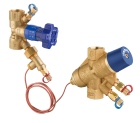Commissioning as the key to energy efficiency

With energy costs continuing to rise, Albion Valves UK advises contractors and heating engineers that a well balanced commercial heating system can help address energy wastage. In a poorly balanced system, problems such as irregular temperature control and inconsistent water circulation can occur — driving up operating costs, creating maintenance issues and wasting energy.
Albion highlights several benefits of a balanced system.
•Efficient operation.
•Constant desired room temperature.
•Responsible use of resources.
•Lower maintenance costs.
•Lower carbon emissions.
A well balanced system ensures energy is distributed to where it is needed, as opposed to some areas becoming too hot and others too cold.
Commissioning valves are a trusted first step to a well balanced system. With the growing use of dynamic balancing valves, this can be achieved without the need for complex commissioning processes. The cost of commissioning is generally a small fraction of the total system design cost, but delivers significant savings.
Les Littlewood, sales director, explains, ‘A well-balanced system starts with good system design. The designer calculates the mass of water required at each terminal unit, whether heating or cooling. Balancing valves create additional resistance in each branch to direct water in the required proportion to each terminal unit.
‘Initial design considerations will take into account the size of space to be conditioned, space usage, occupancy, construction materials and their thermal properties, heat losses and gains and general climatic conditions associated with the building.’
Achieving optimum flow rate is essential. Too high a flow rate may cause noise, energy wastage via overflow, pumping costs and potentially poor comfort as a result of overheating. Too low a flow rate may not dislodge entrapped air.
Flow velocities will generally be in the range 0.75 to 1.15 m/s for pipe sizes 1/2 in to 2 in and 0.75 to 3 m/s for size DN65 to DN300 with pipe pressure drop per meter length generally calculated at 140 to 280 kPa.







